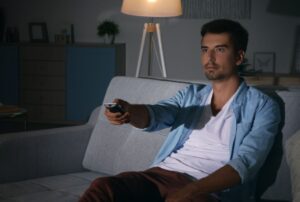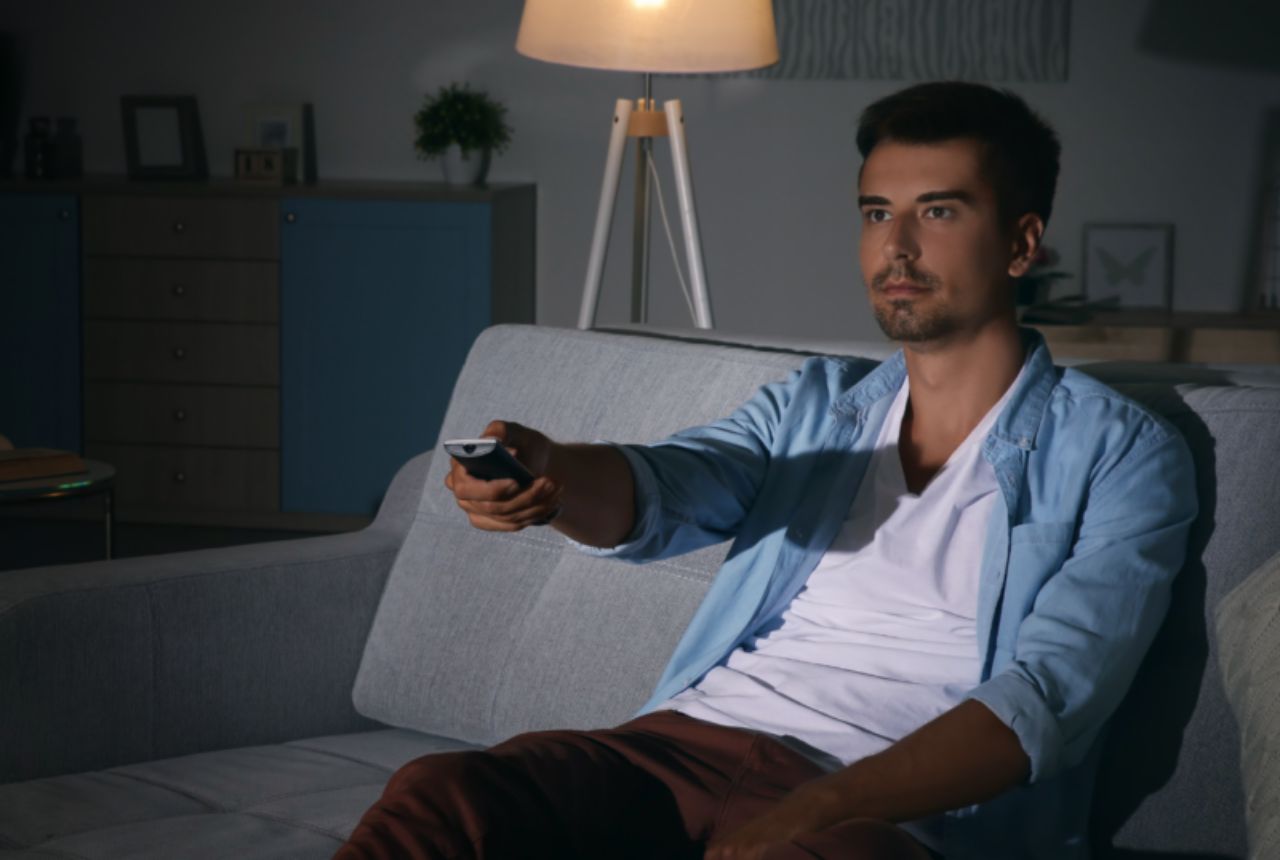We all have our bedtime quirks, and for some of us, that includes falling asleep with the TV on. But did you know this habit can actually reveal a lot about your behaviour, according to psychology?
You see, those who need the hum of a television to drift off to dreamland often exhibit a certain set of behaviours. And don’t worry, I’m not here to judge – I’m here to enlighten.
So, let’s delve into the world of late-night TV watchers. Here are the behaviours they typically display, backed by psychology. Stick around and see if any of them resonate with you.

1) They may be experiencing increased stress
You know that friend who can’t fall asleep without the TV on? Ever wondered why they do it? Well, psychology might have an answer for you.
This behavior is often linked to a higher level of stress. The continuous noise or light from the television can act as a distractor, diverting the person’s attention away from their worries or anxieties.
It’s almost like having a security blanket – the familiar sounds and images can create a sense of comfort and ease, allowing them to relax and eventually fall asleep.
But remember, this is just one potential explanation. People are unique and their reasons for needing the TV on to sleep can vary widely. So while this might be true for some, it doesn’t necessarily apply to everyone. Always approach with empathy and understanding, rather than judgement.
2) They might be habituated to background noise
Now, this one hits close to home. I remember growing up in a bustling household, with siblings arguing, parents discussing the day’s events, and the hum of the TV always in the background.
This constant noise became a comforting soundtrack to my life. So much so, that when I moved out for university, the silence of my dorm room was deafening. I found myself unable to sleep without some sort of background noise.
Turns out, this is quite common. People who need the TV on to fall asleep may have grown accustomed to background noise. The TV serves as a familiar auditory backdrop that makes them feel more secure and helps them drift off to sleep.
But remember – it’s not about whether this is good or bad. It’s simply about understanding the behaviors and habits we’ve formed. And hey, if it works for you and doesn’t disrupt your sleep or anyone else’s, then there’s no harm in it!
3) They may have a higher level of creativity
This might come as a surprise, but needing the TV on to fall asleep can be linked to having a more creative mind. Some psychologists speculate that the random images and sounds from the TV might stimulate the creative mind, helping it wind down for the day.
In fact, a study published in the journal of “Personality and Individual Differences” found that individuals who are exposed to moderate levels of ambient noise tend to score higher on tests of creative thinking.
Get Smarter Everyday Join Us On WhatsApp
So, next time you notice someone falling asleep with the TV on, instead of labelling it as an odd habit, consider the possibility that they might just be nurturing their creative genius.
4) They might struggle with insomnia
Insomnia is a sleep disorder that affects many people, and it’s not uncommon for those who suffer from it to rely on the TV to help them fall asleep. The soft light and the steady stream of sound can provide a distraction from the frustrating struggle of trying to sleep.
It’s akin to counting sheep, but instead, they’re following the plot of a late-night show or listening to the hum of a news channel. This can create a sense of relaxation and fatigue that eventually helps them drift off.
Of course, if you or someone you know is struggling with insomnia, it’s always wise to seek professional help. While the TV trick might work for some, it’s not a permanent solution and could even lead to other sleep problems down the line.
5) They may use it as a form of companionship
Let’s face it, we’ve all experienced nights where loneliness seems to echo in the silence of our rooms. For some people, falling asleep with the TV on can feel like having a companion in those quiet hours.
The voices from the TV can fill the room, making it seem less empty. It’s almost like having someone there with you, sharing the stillness of the night. The TV doesn’t judge, doesn’t demand conversation, it just provides a soothing presence.
So, before we rush to label such behavior as ‘odd’, let’s remember that everyone has their own way of coping with loneliness. And for some of us, that might just mean falling asleep to the sound of our favorite TV show.
6) They might be battling fear of the dark
I’ll be honest, as a kid, I was terrified of the dark. Every creak of the house, every shadow on the wall would send my imagination spiraling. The solution? Leaving the TV on as I slept.
And it’s not uncommon. Many people who sleep with the TV on might be doing so to combat their fear of the dark. The glow from the television can provide a sense of security, keeping those imaginary monsters at bay.
Overcoming this fear is a personal journey, and while some may outgrow it, others might carry it into adulthood. It’s essential to remember that everyone has fears and finding ways to cope with them is part of being human.
7) They’re likely to be night owls
Ever noticed how some people are brimming with energy late at night while others can barely keep their eyes open past dinner? Well, the former are often referred to as ‘night owls’, and they’re more likely to fall asleep with the TV on.
Night owls typically find it hard to wind down early in the evening. The TV can help them transition into sleep mode by providing a passive activity that doesn’t require much mental or physical effort.
However, being a night owl comes with its own challenges. It can be tough to adhere to conventional schedules and this could lead to less sleep overall. If this is you, consider finding ways to adjust your sleep schedule for better rest and recovery.
Get Smarter Everyday Join Us On WhatsApp
8) It’s about comfort, not dependency
At the heart of it all, people who sleep with the TV on are often simply seeking comfort. The glow of the screen, the murmur of voices, it’s all about creating a soothing environment that helps them relax.
While some might view it as a dependency, it’s important to remember that we all have our unique ways of finding comfort. As long as it’s not disrupting their sleep or resulting in daytime fatigue, there’s no cause for concern.
After all, good sleep is about feeling safe and comfortable. And if the TV helps achieve that, then it’s serving its purpose.
Final thoughts: It’s all about individuality
The beauty of human behavior lies in its diversity. Each person is a unique tapestry of habits, preferences, and quirks – including the way we sleep.
For some of us, drifting off to sleep amid the glow and hum of a television is comforting. It’s not about dependency or avoidance, it’s simply a personal preference that makes us feel secure.
Remember, psychology doesn’t offer one-size-fits-all answers. It provides insights, patterns, and possibilities. There’s no right or wrong way to fall asleep – only what works best for each individual.
So whether you’re a night owl who finds solace in late-night talk shows, or someone who cherishes the silence of the night, embrace your sleep habits. After all, they’re part of what makes you, well…you.
If you found this blog post insightful be sure to share it with those out there that are still not aware of it Don't forget to FOLLOW US on Facebook and hit the LIKE button for more new content. Thanks so much for reading.....









